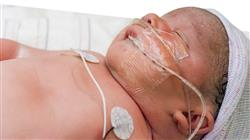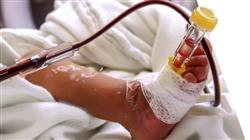University certificate
The world's largest faculty of nursing”
Introduction to the Program
Incorpora a tu práctica diaria los avances más importantes en asfixia intraparto, urgencias quirúrgicas e isoinmunización Rh en Neonatal Emergencies for Nursing

Desde un análisis exhaustivo de la prematuridad a las diferentes patologías que pueden derivar de la misma, el enfermero debe disponer de una serie de conocimientos avanzados en esta área, ya que recae en sus competencias cuidar al niño sano hasta los 28 días de vida. Durante este periodo, de especial fragilidad para los neonatos, las intervenciones deben ser rápidas y precisas si se presentan diversas complicaciones.
Ahí es donde entra en juego, precisamente, el perfeccionamiento de las competencias y nivel de actualización del enfermero. Este programa universitario de TECH hace inciso en las áreas de actuación más importantes en las Urgencias Neonatales, reuniendo los avances más importantes dados en los últimos años.
Asimismo, el personal docente del Postgraduate certificate, compuesto por profesionales con una vasta experiencia en el campo, han recopilado la práctica clínica de mayor eficacia. De este modo, el enfermero tiene acceso tanto a los postulados científicos más recientes como la visión práctica necesaria y actual en los servicios de Urgencias Neonatales más exigentes.
Todo ello favorecido por un formato completamente online, ausente de horarios prefijados o clases presenciales. La propia matrona es la que se distribuye su tiempo de estudio, pudiendo descargarse la totalidad del temario desde el primer día.
Además, los especialistas tendrán la posibilidad de acceder a una exclusiva Masterclass de alto nivel académico, que será conducida por un destacado ginecólogo, reconocido internacionalmente como un destacado experto en Obstetricia y Diagnóstico Prenatal. De esta manera, esta sesión adicional permitirá a los profesionales mejorar sus habilidades y conocimientos prácticos en un área médica de gran demanda.
¡Actualiza tus conocimientos en Obstetricia y Diagnóstico Prenatal de la mano de TECH! Podrás acceder a una Masterclass suplementaria impartida por un reconocido experto internacional”
Este Postgraduate certificate en Neonatal Emergencies for Nursing contiene el programa educativo más completo y actualizado del mercado. Sus características más destacadas son:
- El desarrollo de casos prácticos presentados por expertos en Urgencias Obstétricas y Neonatales
- Los contenidos gráficos, esquemáticos y eminentemente prácticos con los que está concebido recogen una información científica y práctica sobre aquellas disciplinas indispensables para el ejercicio profesional
- Los ejercicios prácticos donde realizar el proceso de autoevaluación paramejorar el aprendizaje
- Su especial hincapié en metodologías innovadoras
- Las lecciones teóricas, preguntas al experto, foros de discusión de temas controvertidosy trabajos de reflexión individual
- La disponibilidad de acceso a los contenidos desde cualquier dispositivo fijo o portátil
con conexión a internet
Actualízate con un temario creado por profesionales que conocen el área de las Neonatal Emergencies for Nursing de primera mano, dándote la perspectiva práctica necesaria para toda la teoría científica tratada”
El programa incluye en su cuadro docente a profesionales del sector que vierten en esta capacitación la experiencia de su trabajo, además de reconocidos especialistasde sociedades de referencia y universidades de prestigio.
Su contenido multimedia, elaborado con la última tecnología educativa, permitirá a los profesionales un aprendizaje situado y contextual, es decir, un entorno simulado que proporcionará una capacitación inmersiva programada para entrenarse ante situaciones reales.
El diseño de este programa se centra en el Aprendizaje Basado en Problemas, mediante el cual los profesionales deberán tratar de resolver las distintas situaciones de práctica profesional que se le planteen a lo largo del programa académico. Para ello, contará con la ayuda de un novedoso sistema de vídeos interactivos realizados por reconocidos expertos.
Profundiza y moderniza en las claves necesarias respecto a los problemas neurológicos en neonatos, alteraciones metabólicas y errores congénitos metabólicos.

Tú decidirás cuando, donde y cómo asumir toda la carga lectiva, sin tener que sacrificar ningún aspecto de tu vida personal o profesiona.
Why study at TECH?
TECH is the world’s largest online university. With an impressive catalog of more than 14,000 university programs available in 11 languages, it is positioned as a leader in employability, with a 99% job placement rate. In addition, it relies on an enormous faculty of more than 6,000 professors of the highest international renown.

Study at the world's largest online university and guarantee your professional success. The future starts at TECH”
The world’s best online university according to FORBES
The prestigious Forbes magazine, specialized in business and finance, has highlighted TECH as “the world's best online university” This is what they have recently stated in an article in their digital edition in which they echo the success story of this institution, “thanks to the academic offer it provides, the selection of its teaching staff, and an innovative learning method aimed at educating the professionals of the future”
A revolutionary study method, a cutting-edge faculty and a practical focus: the key to TECH's success.
The most complete study plans on the university scene
TECH offers the most complete study plans on the university scene, with syllabuses that cover fundamental concepts and, at the same time, the main scientific advances in their specific scientific areas. In addition, these programs are continuously being updated to guarantee students the academic vanguard and the most in-demand professional skills. In this way, the university's qualifications provide its graduates with a significant advantage to propel their careers to success.
TECH offers the most comprehensive and intensive study plans on the current university scene.
A world-class teaching staff
TECH's teaching staff is made up of more than 6,000 professors with the highest international recognition. Professors, researchers and top executives of multinational companies, including Isaiah Covington, performance coach of the Boston Celtics; Magda Romanska, principal investigator at Harvard MetaLAB; Ignacio Wistumba, chairman of the department of translational molecular pathology at MD Anderson Cancer Center; and D.W. Pine, creative director of TIME magazine, among others.
Internationally renowned experts, specialized in different branches of Health, Technology, Communication and Business, form part of the TECH faculty.
A unique learning method
TECH is the first university to use Relearning in all its programs. It is the best online learning methodology, accredited with international teaching quality certifications, provided by prestigious educational agencies. In addition, this disruptive educational model is complemented with the “Case Method”, thereby setting up a unique online teaching strategy. Innovative teaching resources are also implemented, including detailed videos, infographics and interactive summaries.
TECH combines Relearning and the Case Method in all its university programs to guarantee excellent theoretical and practical learning, studying whenever and wherever you want.
The world's largest online university
TECH is the world’s largest online university. We are the largest educational institution, with the best and widest online educational catalog, one hundred percent online and covering the vast majority of areas of knowledge. We offer a large selection of our own degrees and accredited online undergraduate and postgraduate degrees. In total, more than 14,000 university degrees, in eleven different languages, make us the largest educational largest in the world.
TECH has the world's most extensive catalog of academic and official programs, available in more than 11 languages.
Google Premier Partner
The American technology giant has awarded TECH the Google Google Premier Partner badge. This award, which is only available to 3% of the world's companies, highlights the efficient, flexible and tailored experience that this university provides to students. The recognition as a Google Premier Partner not only accredits the maximum rigor, performance and investment in TECH's digital infrastructures, but also places this university as one of the world's leading technology companies.
Google has positioned TECH in the top 3% of the world's most important technology companies by awarding it its Google Premier Partner badge.
The official online university of the NBA
TECH is the official online university of the NBA. Thanks to our agreement with the biggest league in basketball, we offer our students exclusive university programs, as well as a wide variety of educational resources focused on the business of the league and other areas of the sports industry. Each program is made up of a uniquely designed syllabus and features exceptional guest hosts: professionals with a distinguished sports background who will offer their expertise on the most relevant topics.
TECH has been selected by the NBA, the world's top basketball league, as its official online university.
The top-rated university by its students
Students have positioned TECH as the world's top-rated university on the main review websites, with a highest rating of 4.9 out of 5, obtained from more than 1,000 reviews. These results consolidate TECH as the benchmark university institution at an international level, reflecting the excellence and positive impact of its educational model.” reflecting the excellence and positive impact of its educational model.”
TECH is the world’s top-rated university by its students.
Leaders in employability
TECH has managed to become the leading university in employability. 99% of its students obtain jobs in the academic field they have studied, within one year of completing any of the university's programs. A similar number achieve immediate career enhancement. All this thanks to a study methodology that bases its effectiveness on the acquisition of practical skills, which are absolutely necessary for professional development.
99% of TECH graduates find a job within a year of completing their studies.
Postgraduate Certificate in Neonatal Emergencies for Nursing.
Neonatal emergencies are critical situations that may arise in the newborn that require rapid and effective intervention. It is crucial that nurses working in neonatology have the skills necessary to assess and treat infants presenting with these situations. Neonatal emergencies can include respiratory problems, metabolic disorders, infections, neurological disorders, congenital heart disease and trauma, among others.
To develop nursing skills in neonatal emergency care, it is essential to have adequate training in neonatology, including knowledge of neonatal physiology and pathology, neonatal care and treatment techniques, and technical skills, such as endotracheal intubation and umbilical intubation. In addition, interpersonal skills and effective communication skills with parents and other members of the health care team are important.
Nurses should always be alert to signs of clinical deterioration in the newborn and perform a thorough assessment of the patient. This may include monitoring vital signs, assessing level of consciousness, and assessing respiratory, cardiac, and neurologic status.
Treatment of a neonatal emergency may vary depending on the patient's clinical situation, but may include administration of medications, endotracheal intubation, mechanical ventilation, and performance of diagnostic tests, such as chest x-ray and echocardiography.
The nurse must also provide emotional support and education to parents, as the hospitalization of their newborns can be a difficult experience for them. This involves clear and effective communication about the baby's health status and plan of care.
The development of neonatal emergency care nursing skills is critical in newborn care and requires appropriate neonatology training, technical skills, interpersonal skills, effective communication, and ongoing assessment of the patient's clinical status.







